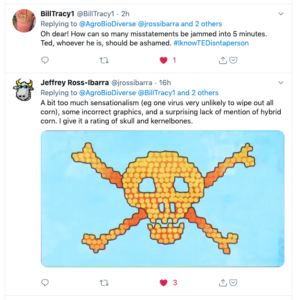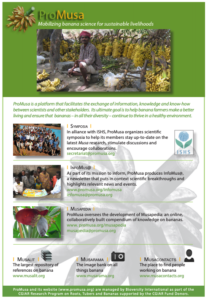- Modelling crop diversification and association effects in agricultural systems. Intercrop, people!
- Cooking up Diverse Diets: Advancing Biodiversity in Food and Agriculture through Collaborations with Chefs. Yeah, yeah, chefs are great. Now show me the data.
- Multivariate analysis and selection criteria for identification of African rice (Oryza glaberrima) for genetic improvement of indica rice cultivars. Go for high number of productive tillers and early maturity.
- Strategies for Sustainable Use of Indigenous Cattle Genetic Resources in Southern Africa. Not just genetic improvement: also need better nutrition, healthcare, marketing, and infrastructure; integration and empowerment of women and youth; and capacity building, regulatory, and policy frameworks. Not unlike crops, really.
- Population structure of Miscanthus sacchariflorus reveals two major polyploidization events, tetraploid-mediated unidirectional introgression from diploid M. sinensis, and diversity centred around the Yellow Sea. The centre of origin in under water.
- Remote sensing for agricultural applications: A meta-review. Yeah, yeah. Call me when you have a way of distinguishing landraces from modern varieties.
- Genetic Diversity of Sweet Potato (Ipomoea batatas L. Lam) Germplasms Collected Worldwide Using Chloroplast SSR Markers. 500 is not enough.
- Seed germination and storage studies in seed-fertile Musa indandamanensis and its conservation. Intermediate.
- Cultivated olive diversification at local and regional scales: evidence from the genetic characterization of French genetic resources. Areas with unexpected frosts have been, paradoxically, good for olive diversity.
- Genetic diversity of Nile tilapia (Oreochromis niloticus) throughout West Africa. Corresponds to river basins. Well there’s a shocker.
- Protecting half of the planet could directly affect over one billion people. Add lowest-footprint pixels to PAs until you get to 50% coverage of each ecoregion, then count how many people live in PAs, for good or ill.
- Food Access Deficiencies in Sub-saharan Africa: Prevalence and Implications for Agricultural Interventions. Livestock helps, higher income not necessarily.
- Can a speed breeding approach accelerate genetic gain in pigeonpea? I’m going to guess yes.
- Hypoallergen Peanut Lines Identified Through Large-Scale Phenotyping of Global Diversity Panel: Providing Hope Toward Addressing One of the Major Global Food Safety Concerns. Lots of diversity to play with.
- Revolturas: resisting multinational seed corporations and legal seed regimes through seed-saving practices and activism in Colombia. Everybody’s at it.
Nibbles: Cheese history, RethinkX, Cosmopolitan Chicken, Natural capital accounting, Supply chains, Healthy policies, NordGen
- Fruit flies facilitated the birth of the hybrid yeast that made cheese possible. Thanks, fruitfly!
- Ah, but an upgrade is coming: precision fermentation.
- How business can track its effects on biodiversity. Should it want to.
- How to make it easier, more profitable and more sustainable to bring healthy foods to market. Someone mash it up with the above?
- How to design policies for countries seeking to provide healthy diets. Someone mash it up with the above?
- 40 years of NordGen. Happy birthday! Then someone mash it up with the above…
- Celebrating poultry diversity through art. No need for mashing, just celebrate the weirdness.
Deconstructing crop TED
 TED-Ed has a bunch of videos on the history of different crops: cacao, tea, and maize for a start. They’re cute, and do provide some interesting information. But a pinch of salt is recommended with your corn on the cob.
TED-Ed has a bunch of videos on the history of different crops: cacao, tea, and maize for a start. They’re cute, and do provide some interesting information. But a pinch of salt is recommended with your corn on the cob.
Yes, we have plenty of banana information, take 2
A new version of the Musa Germplasm Information System (MGIS) is out. There’s more data, tools for better curation, a way to search for accessions cited in the literature, and re-organized menus. Do check it out. MGIS data eventually makes its way to Genesys.
And since I’m here, it’s worth noting that the banana is uniquely well-endowed with information resources. In addition to MGIS, there’s a whole slew of other databases and assorted information products, thanks to the wonder that is ProMusa.
ProMusa is a network of people promoting scientific discussions on bananas.
In alliance with the International Society for Horticultural Science (ISHS), the network organizes scientific symposia (reported in proceedings) to help its members stay up-to-date on the latest research developments and encourage collaborations within and between disciplines.
When not meeting face-to-face, ProMusa members stay in touch using the network’s mailing list.
This website is the network’s online platform, which offers news, knowledge and information on bananas.
 The centrepiece is Musapedia, “an online, collaboratively built compendium of knowledge on bananas.” But there are also databases of scientific literature, images and contacts. And an excellent news area — InfoMus@.
The centrepiece is Musapedia, “an online, collaboratively built compendium of knowledge on bananas.” But there are also databases of scientific literature, images and contacts. And an excellent news area — InfoMus@.
You can follow — and interact with — ProMusa on Facebook and Twitter. I can’t think of a crop that has anything similarly comprehensive. It really should be your first port of call for anything to do with bananas.
Gabe Sachter-Smith laid out in a spiral a sample of the more than 100 types of bananas documented during the collecting mission to West New Britain, PNG. They include the ever mysterious Fe'i banana, photographed next to its possible ancestor, Musa maclayi. pic.twitter.com/HahIXm1P4K
— ProMusa (@promusa_banana) October 11, 2019
BTW, the title of this post refers to a previous foray into banana information resources.
Nibbles: Writing rules, CWR project, Foxes, Agrodealers, Etruscan diet
- Science writing 101.
- Science writing about crop wild relatives collecting.
- The animal domestication syndrome may not be a thing.
- The last rural mile: a survey of agrodealers in E. Africa.
- Eat like an Etruscan.